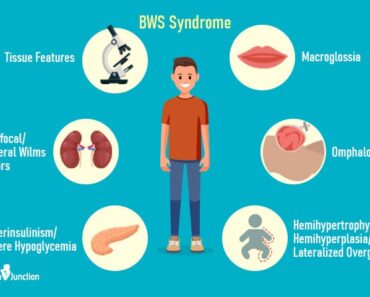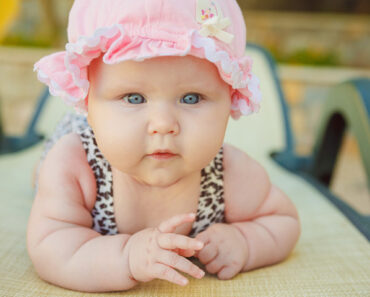Baby eczema, also known as infantile eczema, presents a group of conditions characterized with dry .red, itchy and inflamed skin (1). Eczema often appears in pediatric age, most commonly in the first six months of the baby’s life. Read this post to learn more about the causes, risk factors, symptoms, and treatment of baby eczema.
Causes Of Baby Eczema
The exact cause of baby eczema is not known. However, it is suggested that genetic and environmental factors play critical roles in the development of skin inflammation (2).
Eczema may often be associated with a lack of filaggrin, which is a skin barrier protein. Filaggrin protects the skin from environmental irritants and bacteria by preventing their entry into the skin. Many children who have eczema usually have too little of this strong barrier protein in their skin (3).
Triggers such as irritants could activate the immune system, thus causing skin damage as a result of inflammatory response.
Risk Factors For Baby Eczema
There is a high risk of baby eczema in the following cases (4) (5).
- A family member or close relatives has eczema
- Food allergies
- Asthma or other respiratory allergies
- Seasonal allergies, such as allergic rhinitis (hay fever)
- Dry climate
- Exposure to allergic chemicals or products, vehicular pollution, and tobacco smoke
- Exposure to allergens, such as pollen, mold, and dust mites
Can Breastfeeding Cause Eczema In Babies?
Breast milk contains compounds such as α-tocopherol, β-tocopherol, and prolactin—all help degrade inflammatory compounds, increase immune function, and decrease sensitivity of infants, thus many studies and meta-analysis found that breastfeeding could prevent atopic eczema in children.
The American Academy of Pediatrics warns breastfeeding mothers to avoid consuming allergic foods if their babies are at high risk of developing eczema. Examples of potential dietary allergens include (6):
- Nuts, especially peanuts
- Eggs
- Cow milk
- Fish and seafood
Although hydrolyzed formula feeding may not have the risk of causing eczema since the contents are well regulated, breastfeeding is still recommended as a nutritional source for babies. Lactating mothers should avoid dietary factors that cause trouble to your little one.
Also, taking probiotics as well as other dietary supplements such as vitamin C and omega-3 in lactating mothers have shown beneficial effects in preventing a topic dermatitis and eczema, in some studies.
You may seek a certified nutritionist’s help to plan a hypoallergenic maternal diet to meet your little ones’ optimal requirements and prevent skin issues in them.
What Does Baby Eczema Look Like?
Parents are likely to notice skin rashes that are generalized (all over the body) or in some areas. You may also notice raised bumps, circular rashes, or flaky skin (4). Eczema rashes may look red or dry, and you may notice changes in a rash over time. Although eczema may occur at any age, the affected location and type of rash may vary in different age groups (7).
During an exacerbation or flare-up, you may notice the worsening of eczema rash, and it may look better during remissions.
Signs And Symptoms Of Baby Eczema
The following are the signs and symptoms of baby eczema (1) (7) (8).
- Dry or red skin is the main symptom of eczema. The skin may also become scaly.
- The main symptom is itching. If it doesn’t itch, it’s not eczema.
- Eczematous skin is more prone to infection. Bacterial and viral infections of eczematous skin may cause honey-colored crusts (yellowish-orange crusts), pus, and fever.
- A severe food allergy can sometimes be associated with skin rashes. Severe food allergy can also cause swollen or bluish lips and breathing difficulties, which is a medical emergency.
Where Does The Eczema Rash Appear In Infants?
The following are some of the areas where eczema rash usually appears in infants.
- Eczema shows around one to six months of age on the cheeks, and can spread to the rest of the face, around the lips and on the forehead. In infants, the outer surfaces of the arms and legs also become involved (1).
- Babies who crawl may display rashes on the elbows, knees, and other parts of the body that are prone to friction while crawling.
- Eczema may not affect the diaper area due to the presence of moisture.
When To See A Doctor?
You may seek your pediatrician’s advice if you notice any skin rashes or eczema symptoms in your baby. A doctor can diagnose the exact cause and prescribe a treatment.
Seek immediate medical care in the following situations (8).
l Fever and signs of a skin infection, such as redness and pus
- Baby is less than three months old
- Blisters or vesicles on the skin
- Baby cries while scratching or touching the eczema rash
Contact the doctor if you have any concerns, or if your baby is sick. The doctor can diagnose the skin rash by observation and may order some tests to identify allergic reactions. Exact diagnosis is crucial to determine the type of eczema and the subsequent management plan.
Types Of Eczema
There are various types of eczema, although the skin rash may look similar. The types of eczema include the following (9) (10).
- Atopic dermatitis (AD) is the most common form of eczema in babies (2). It may often occur due to other allergy-related conditions, such as allergic rhinitis (hay fever), food allergies, and asthma.
- Contact dermatitis can be caused when the skin comes into direct contact with irritants. A few examples of irritants include clothes made from wool, pet dander, and even certain skincare products.
- Seborrheic dermatitis is the inflammation of the skin in areas of the body that are rich in sebaceous (oil) glands. Seborrheic dermatitis is often called cradle cap when it occurs in babies. The condition may cause flaky patches, which look like dandruff on the baby’s scalp.
- Stasis dermatitis is the skin inflammation caused due to inadequate venous drainage (blood flow) in the lower extremity. This is usually more common in adults than in children.
- Nummular eczema, also known as discoid eczema or nummular dermatitis, causes coin-shaped skin rashes over the body. These skin lesions may also ooze clear fluid or appear dry.
- Dyshidrotic eczema, also called dyshidrosis, pompholyx, or vesicular hand dermatitis, is a type of eczema that causes an eruption of tiny fluid-filled vesicles in the palms and soles or between fingers.
Although some forms of eczema are common in adults, it is possible to have any type of eczema, at any age. Babies may also have more than one type of eczema at the same time.
Treatment For Eczema In Babies
Although there is no permanent cure for baby eczema, most cases can be managed with baby moisturizers, avoiding triggering factors, customized daily skin care, and prescription medications.
In general, the three-pronged therapeutic approach consists of:
- Hygiene
- Applying an emollient twice daily (morning and evening) for atopic dermatitis, as the skin barrier – a natural barrier – must be restored
- Topical corticosteroids usually prescribed once a day to all lesions, until they disappear
Topical corticosteroids
Pharmacological treatment for baby eczema may begin with mild topical corticosteroids. However, if there is no improvement or your baby has severe eczema, stronger corticosteroid creams or ointments can be prescribed (11).
Topical corticosteroids can be available as ointments, creams, sprays, or lotions. You should seek a doctor’s help to determine the amount, duration, and type of corticosteroid treatment for your baby (12).
Your doctor may also recommend antibiotic creams if an infection is present and antihistamine creams for severe itching.
Eczema may worsen if left untreated, and the skin may become more prone to infections. You should initiate treatment for infantile eczema with an expert as soon as it comes to your attention.
Home Remedies For Baby Eczema
The following home treatments can be recommended by pediatricians to manage baby eczema (12).
1. Proper bathing techniques
Proper bathing techniques help eliminate eczema triggers, such as dirt and irritants, from your little one’s body. The following ways may help you master baby bath techniques.
- Wash your baby in lukewarm water.
- You may use fragrance-free and mild baby cleansers.
- You should avoid scrubbing since it may cause skin damage.
- Five to ten minutes of bathing time is ideal.
- Pat dry your baby; avoid rubbing with towels.
- Use baby moisturizer soon after the bath. You may use thick emolient creams, lotions.
- You may moisturize the skin twicea day or as recommended by your doctor.
Many parents consider bleach bath therapy to reduce symptoms. However, this is seldom recommended for babies, and bleach can be a potential skin irritant (9) (12). Consult your baby’s doctor before trying out this method.
2. Avoid triggering factors
If your baby has skin rashes due to environmental irritants or food allergies, then eliminating these triggers could help cure the condition. A pediatric dermatologist can help you identify these triggering factors.
Some of the common triggers that a baby may encounter are the following.
- Sweat
- Drooling (saliva)
- Smoke
- Dry air
- Pet dander
- Pollen
- Detergents and fabric softeners
- Certain clothing, such as woolen cloths
- Shampoos, baby powders, soaps, and other baby products
- Baby wipes
You can eliminate a triggering factor if you are able to identify it. Fragrance-free baby products may trigger less allergic reactions than products with fragrance.
Does Baby Eczema Cure By Itself?
Eczema may disappear before the schooling age, which is around the age of four years (1). However, some infants may continue to have eczema in adulthood (4).
It is not possible to determine who will be cured during childhood and who will be affected in adulthood. In adults, eczema may cause psychological issues such as depression and anxiety, possibly due to the appearance of the skin. Therefore, it is essential to manage this skin condition with an expert at an early stage for better outcomes.
Frequently Asked Questions
1. Should babies with eczema bathe daily?
Daily bathing and moisturizing are recommended to prevent the worsening of eczema and relieve symptoms (13). Good skin care is the best way to manage dry skin in babies with atopic dermatitis. Routine skin care could help remove bacteria and other irritants from the baby’s skin.
Always use skincare products as recommended by the doctor. Baby’s skin is sensitive, and using products meant for adults or unapproved home treatments could damage their skin.
2. What foods trigger eczema in babies?
Atopic dermatitis or eczema can often be associated with food allergies. In some babies, food allergy might be the reason for eczema. Eggs, peanuts, and cow’s milk proteins and milk products could be significant contributors to food allergies in weaning babies (10). Eczema in breastfed infants may often be associated with maternal dietary factors.
If you notice any skin changes in your baby after giving any food items, then you may seek medical care to identify the exact triggers and causes.
3. Does breast milk help eczema?
Breast milk is a cost-effective and readily available treatment for mild and moderate baby eczema. Randomized clinical trials conducted in 2015 to assess the efficacy of topical application of human breast milk to control eczema had shown that it is beneficial in treating mild to moderate disease. The study had shown that the use of human breast milk was as effective as hydrocortisone 1% ointment (14).
Breast milk can be applied to the affected area using a cotton ball. It is recommended for infants with mild to moderate eczema. In addition to the topical application, breastfeeding protects against infections.
However, you may seek a pediatrician’s advice for an exact diagnosis and to assess the severity of eczema. Severe eczema may require pharmacological treatment.
4. Is eczema painful for babies?
Eczema can be painful, especially if you notice redness and swelling in the skin. This may also cause itching. Older babies may try to scratch their skin, whereas younger babies may cry more than usual when their skin becomes itchy and irritated (10).
Eczema is not a contagious disease, which means it cannot be transmitted to other people through contact. Although baby eczema may not be associated with severe health problems, it may make the baby’s skin more vulnerable to infections.
Eczema is a chronic skin condition and often requires long-term treatment. Always seek help from a pediatrician or a pediatric dermatologist to establish a proper eczema management plan and to choose hypoallergenic moisturizer if your baby has sensitive skin. It is essential to stick to these plans to ensure skin improvement and positive results.

































